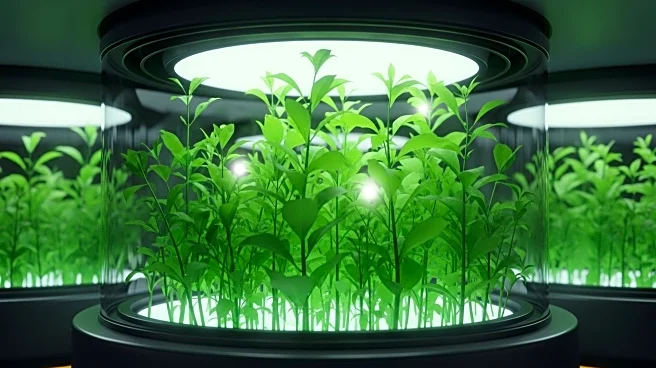What's Happening?
The plant molecular farming market is experiencing significant growth due to advancements in vaccine and therapeutic protein production. This growth is driven by the increasing demand for cost-effective, scalable, and sustainable production methods for biopharmaceuticals and therapeutic proteins. Concerns over infectious diseases and chronic health conditions are pushing the need for new drug production platforms, with plants serving as a sustainable alternative to traditional cell cultures. The market is further bolstered by increased investments in biotechnology research and advancements in genetic engineering and plant-based expression systems. North America leads the market due to its advanced biotechnology infrastructure and strong R&D efforts, while Asia Pacific is emerging as the fastest-growing region, supported by rising healthcare expenditures and enhanced biotechnology capabilities.
Why It's Important?
The expansion of the plant molecular farming market is crucial for the biomanufacturing industry as it offers a sustainable and cost-effective alternative to traditional methods. This shift towards plant-based systems is expected to enhance efficiency and global access to essential therapeutics, addressing the growing demand for affordable healthcare solutions. Pharmaceutical and biotechnology companies stand to benefit significantly from these innovations, as they can produce therapeutics on a large scale quickly and efficiently. The market's growth also reflects broader trends in biotechnology, emphasizing greener and animal-free production methods, which align with increasing consumer and regulatory demands for sustainable practices.
What's Next?
As the plant molecular farming market continues to expand, further developments in genetic engineering and plant-based expression systems are anticipated. Companies may increase collaborations with research institutions to foster innovation and improve production methods. Additionally, government support for bio-based innovations could accelerate the adoption of plant-based systems, potentially leading to new therapeutic products entering the market. The ongoing growth in Asia Pacific suggests that regional manufacturers may begin large-scale production of vaccines and therapeutic proteins, further diversifying the global biomanufacturing landscape.
Beyond the Headlines
The rise of plant molecular farming could have long-term implications for the biomanufacturing industry, including ethical considerations related to the use of genetically modified organisms. As the industry shifts towards plant-based systems, there may be increased scrutiny on the environmental impact and sustainability of these methods. Furthermore, the market's growth could influence global healthcare policies, encouraging more countries to invest in biotechnology research and development to improve public health outcomes.








